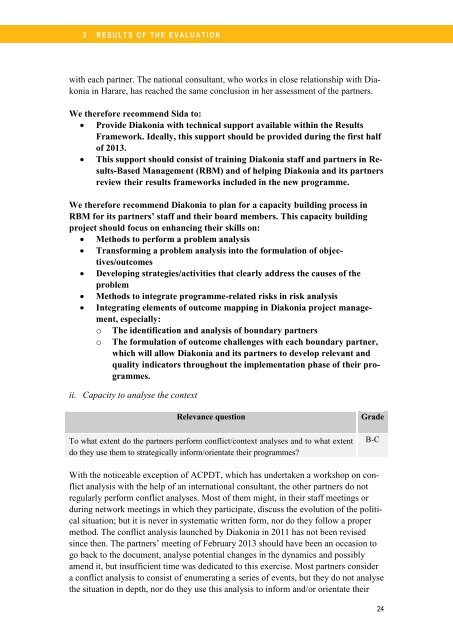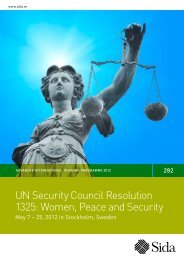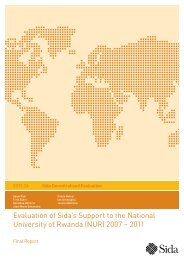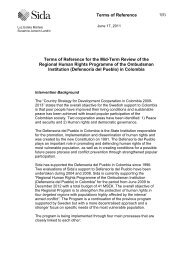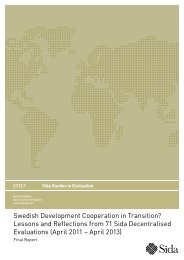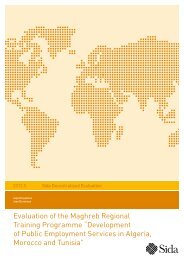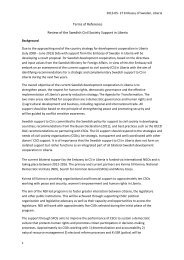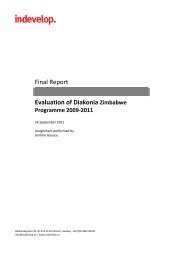Mid-term Review of the Diakonia Strategic Peace Building ... - Sida
Mid-term Review of the Diakonia Strategic Peace Building ... - Sida
Mid-term Review of the Diakonia Strategic Peace Building ... - Sida
Create successful ePaper yourself
Turn your PDF publications into a flip-book with our unique Google optimized e-Paper software.
3 R E S U L T S O F T H E E V A L U A T I O N<br />
with each partner. The national consultant, who works in close relationship with <strong>Diakonia</strong><br />
in Harare, has reached <strong>the</strong> same conclusion in her assessment <strong>of</strong> <strong>the</strong> partners.<br />
We <strong>the</strong>refore recommend <strong>Sida</strong> to:<br />
Provide <strong>Diakonia</strong> with technical support available within <strong>the</strong> Results<br />
Framework. Ideally, this support should be provided during <strong>the</strong> first half<br />
<strong>of</strong> 2013.<br />
This support should consist <strong>of</strong> training <strong>Diakonia</strong> staff and partners in Results-Based<br />
Management (RBM) and <strong>of</strong> helping <strong>Diakonia</strong> and its partners<br />
review <strong>the</strong>ir results frameworks included in <strong>the</strong> new programme.<br />
We <strong>the</strong>refore recommend <strong>Diakonia</strong> to plan for a capacity building process in<br />
RBM for its partners’ staff and <strong>the</strong>ir board members. This capacity building<br />
project should focus on enhancing <strong>the</strong>ir skills on:<br />
Methods to perform a problem analysis<br />
Transforming a problem analysis into <strong>the</strong> formulation <strong>of</strong> objectives/outcomes<br />
Developing strategies/activities that clearly address <strong>the</strong> causes <strong>of</strong> <strong>the</strong><br />
problem<br />
Methods to integrate programme-related risks in risk analysis<br />
Integrating elements <strong>of</strong> outcome mapping in <strong>Diakonia</strong> project management,<br />
especially:<br />
o<br />
o<br />
The identification and analysis <strong>of</strong> boundary partners<br />
The formulation <strong>of</strong> outcome challenges with each boundary partner,<br />
which will allow <strong>Diakonia</strong> and its partners to develop relevant and<br />
quality indicators throughout <strong>the</strong> implementation phase <strong>of</strong> <strong>the</strong>ir programmes.<br />
ii. Capacity to analyse <strong>the</strong> context<br />
Relevance question<br />
To what extent do <strong>the</strong> partners perform conflict/context analyses and to what extent<br />
do <strong>the</strong>y use <strong>the</strong>m to strategically inform/orientate <strong>the</strong>ir programmes?<br />
Grade<br />
B-C<br />
With <strong>the</strong> noticeable exception <strong>of</strong> ACPDT, which has undertaken a workshop on conflict<br />
analysis with <strong>the</strong> help <strong>of</strong> an international consultant, <strong>the</strong> o<strong>the</strong>r partners do not<br />
regularly perform conflict analyses. Most <strong>of</strong> <strong>the</strong>m might, in <strong>the</strong>ir staff meetings or<br />
during network meetings in which <strong>the</strong>y participate, discuss <strong>the</strong> evolution <strong>of</strong> <strong>the</strong> political<br />
situation; but it is never in systematic written form, nor do <strong>the</strong>y follow a proper<br />
method. The conflict analysis launched by <strong>Diakonia</strong> in 2011 has not been revised<br />
since <strong>the</strong>n. The partners’ meeting <strong>of</strong> February 2013 should have been an occasion to<br />
go back to <strong>the</strong> document, analyse potential changes in <strong>the</strong> dynamics and possibly<br />
amend it, but insufficient time was dedicated to this exercise. Most partners consider<br />
a conflict analysis to consist <strong>of</strong> enumerating a series <strong>of</strong> events, but <strong>the</strong>y do not analyse<br />
<strong>the</strong> situation in depth, nor do <strong>the</strong>y use this analysis to inform and/or orientate <strong>the</strong>ir<br />
24


